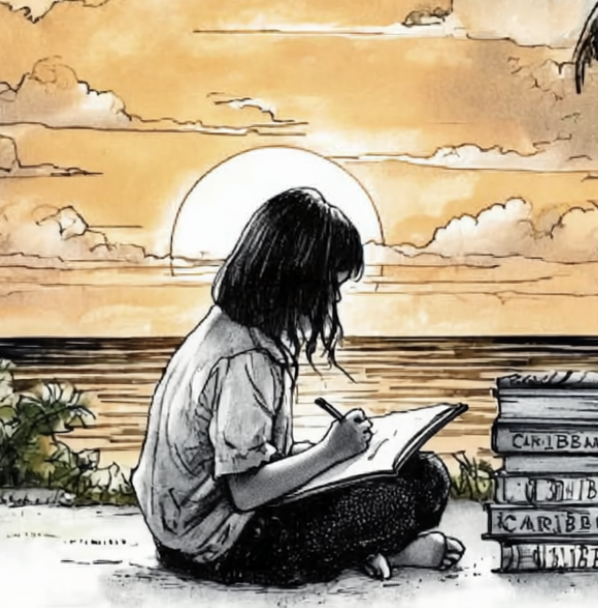This Caribbean Literature course is an invitation to explore a fiercely creative literary tradition shaped by colonialism, revolution, migration, and music. In this one-to-one course, students will read and listen to works by Caribbean writers—especially poets—and engage with the region’s distinctive intersections of class, politics, language, and identity. This course can be designed at either the middle school or high school level. As Caribbean literature is vivid and layered, often nonlinear, and linguistically diverse, this course is designed to help students read well, with cultural and historical awareness, and to see how these writers shaped the modern literary world in ways that are still unfolding.
Topics that this Caribbean Literature Course Might Explore
This is a flexible course—designed to be responsive to student interests and learning styles. Depending on what you bring to the table, we might go deeper into lyrical poetry, political allegory, or performance-based traditions. Some major thematic inquiries might include:
Dialect and Voice
Caribbean writers often work in multiple registers at once—English, Creole, patois, local idioms. Together we’ll examine how dialect is used not just for authenticity but as a form of power: to claim identity, to unsettle standard English, subvert a colonial legacy, and to reach audiences in ways that academic language can’t. In this course you will develop tools to read and appreciate these texts on their own terms—not as outsiders, but as informed literary explorers.
Colonialism and Postcolonial Debate
Caribbean literature is deeply informed by the region’s colonial past. But writers disagree about how to reckon with that legacy. Should literature break from European influence entirely? Revise it from within? We will examine these tensions by comparing texts from different islands and class backgrounds, and by asking how race, class, and education shape perspective.
Oral Tradition and Performed Literature
Unlike many literary traditions centered on print, Caribbean storytelling often lives through the voice—spoken, recited, and improvised. From dub poetry to calypso lyrics to street performances, these forms blur the line between poetry and music, fiction and folklore.
You might explore how these oral genres influenced global pop culture and gave rise to hip-hop and spoken word as we know it.
Power, Family, and Social Class
We’ll read texts that take on generational conflict, inherited trauma, migration, and the complicated intersections of race and class in postcolonial societies.
Possible Texts and Authors
The exact syllabus will be co-designed with each student, but might include:
- Jamaica Kincaid – Annie John or A Small Place
- Derek Walcott – selections from Omeros, The Sea is History, and other poems
- Jean Rhys – Wide Sargasso Sea
- Edwidge Danticat – Brother, I’m Dying or short stories
- V.S. Naipaul – Miguel Street or A House for Mr Biswas
- Kamau Brathwaite – selected poetry
- Claude McKay – Harlem Renaissance poems rooted in Caribbean experience
- Louise Bennett – poetry in Jamaican patois
- Contemporary Caribbean poets and performers – spoken word, music, and hybrid forms
We might also read political essays, listen to oral histories, or even annotate a mixtape, depending on how your interests evolve through the course.
Skills and Assessments
This Caribbean Literature course is designed to build interpretive confidence, sharpen writing, and foster the ability to make connections between literature and the world. You will:
- Build comfort reading and analyzing non-standard English and dialect
- Develop close reading skills across genres
- Explore the historical and political context of texts
- Write informal responses and critical reflections
- Create 1–3 major projects that showcase your understanding
- These projects might take the form of:
- A comparative literary essay
- A creative piece written in dialect or oral style
- A presentation or recorded oral performance
- An original poetic response to a Caribbean work
Final projects will draw on the full scope of the course and will be tailored to your passions—academic, creative, or both.
What Makes This Course Unique
We don’t believe in boilerplate syllabi. At Cicero, we begin with you and build outward. That means this Caribbean Literature Course might:
- Follow a more academic path, preparing students for AP Literature or college-level literary study
- Incorporate worldschooling or place-based exploration if the student is traveling in the region
- Engage creative learners who want to write in Caribbean forms or record spoken-word responses
- Include deep dives into specific cultural topics like Carnival, calypso, colonial education, or migration
- Encourage interdisciplinary exploration with history, music, language, or politics
This is not a lecture course. It’s a conversation—and we take seriously the work of helping you develop your own literary voice in response to the writers they encounter.
Course Objectives
By the end of the course, you will:
- Be familiar with major voices and movements in Caribbean literature
- Understand the historical and political forces shaping this literature
- Be able to analyze dialect, oral form, and non-Western narrative structures
- Appreciate the diversity of Caribbean cultural expression
- Articulate their own literary responses to challenging, complex texts
More broadly, the course aims to help students develop cultural literacy, intellectual confidence, and a deeper empathy for voices that have often been marginalized in mainstream curricula.
Why Caribbean Literature? Why Now?
Caribbean literature might not appear on many standard reading lists—but it should. These writers speak from the edge of empire and the center of resistance. They tell stories in languages the world tries to silence. They imagine freedom not just as political change, but as poetry and possibility.

